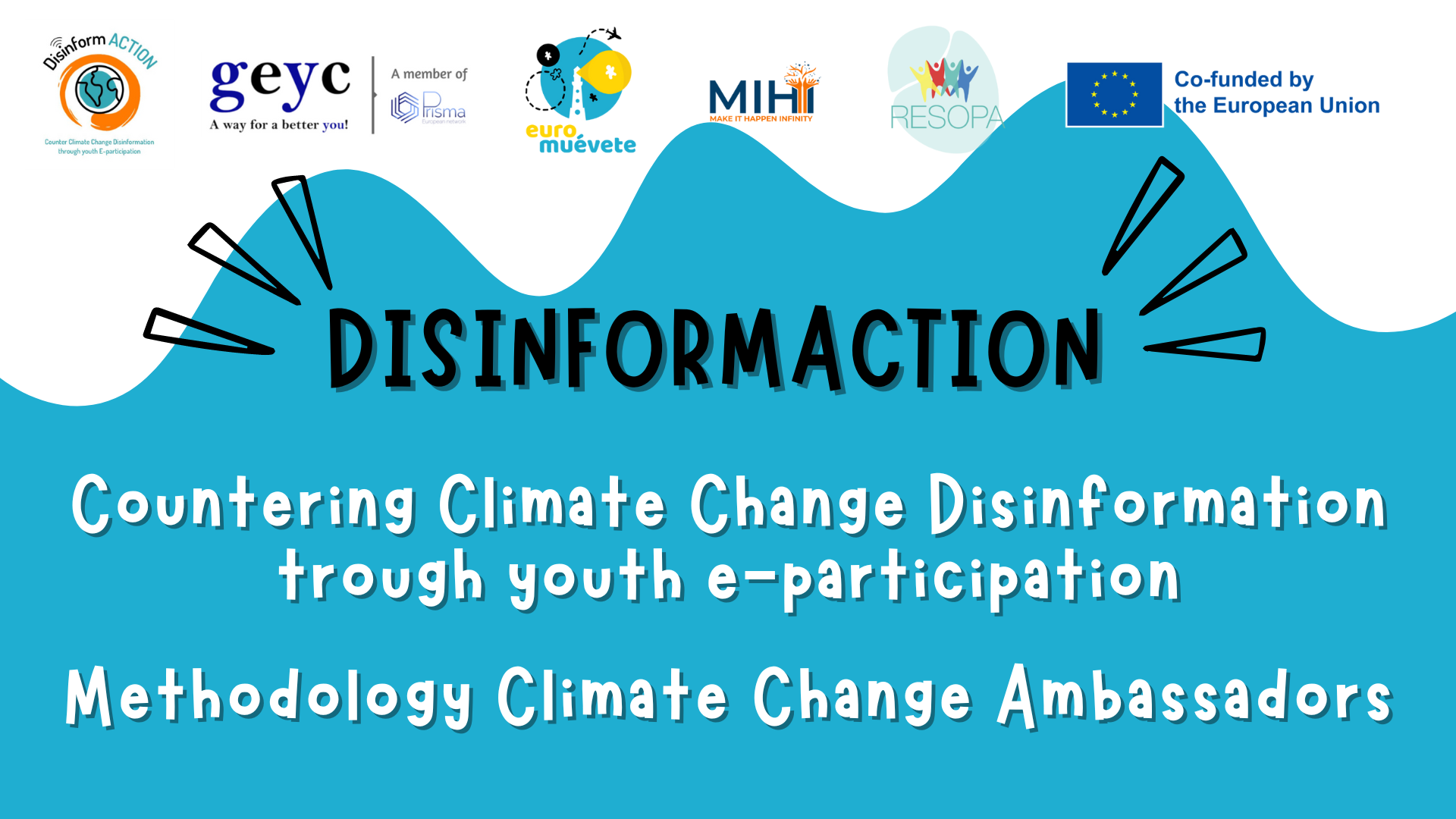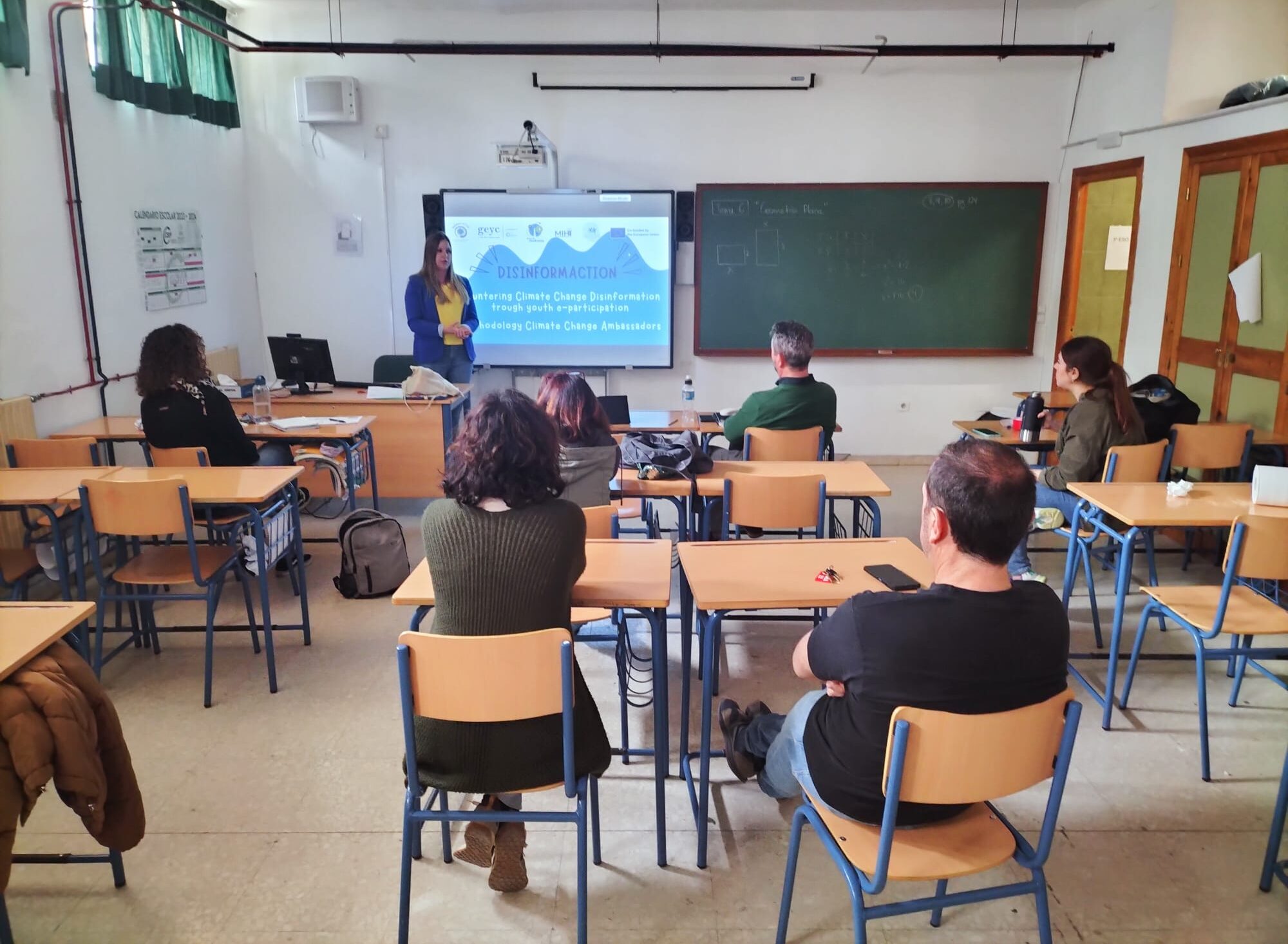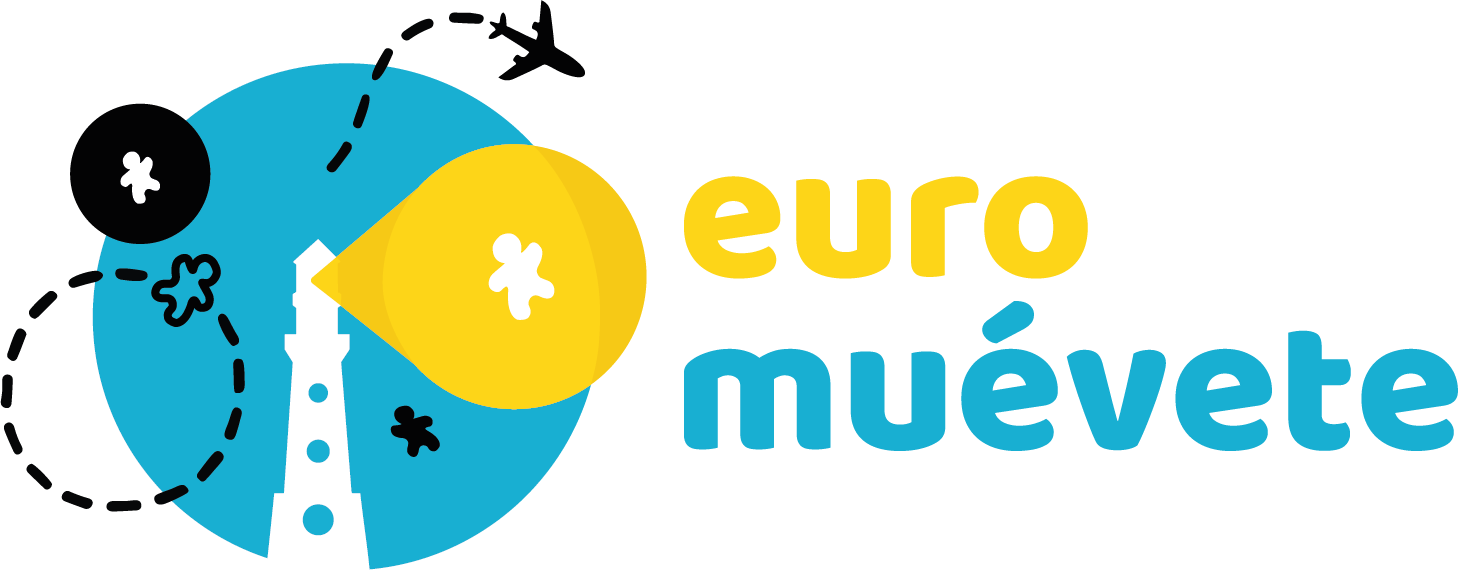“DisinformACTION! – Counter Climate Change Disinformation through youth E-participation” – Teacher trainings in Spain

The teacher training sessions conducted by EuroMuévete aimed to empower educators with the knowledge and skills necessary for implementing the Climate Change Ambassadors methodology in their schools. Two offline training sessions were organized on the 18th of March, attended by 20 participants in total.
The decision to conduct the offline training in 2 different highschools from Antequera was strategic, considering the following factors:
- as NGO we focus on rural areas, we do our Erasmus+ projects in villages, so we decided to collaborate with schools from outside the capital to include teachers with less opportunities since there are more trainings in the capital;
- we also decided to conduct the two trainings in the same day because since is far away from the capital it was more effective to divide our team, so one of us went to one school and the other one went to the other school but in the same village;
- The last decision was to organize these trainings the last week of March because it is the last week before Easter holidays and the teachers have more time to attend a 4 hour course.
Objectives of the training:
- Presentation of methodology: Educators were introduced to the Climate Change Ambassadors methodology along with its activities.
- Implementation tips: Practical tips and tricks were shared based on EuroMuévete’s experience with previous school workshops.
- Simulation activities: Various activities included in the methodology were simulated, providing hands-on experience for better implementation.
- Teacher implementation Stage: The requirements and expectations of the teacher implementation stage were clearly explained.
- Exchange of best practices: The training encouraged the exchange of good practices related to non-formal education methods.
Critical online citizens
Before starting with the first chapter, we decided to do an activity to get to know each other, in which they had to say their name and field, for example: Manuel Rios, geography teacher. Along with this game we explain the aim of the ice-breakers and when to use it, so in some cases they are not going to need it as they already know each other and in other cases maybe it will be needed to change the atmosphere in the group.
For the activity “Climate change: What is real?” We asked the teachers if they knew the differences between the concepts to be worked on in this activity: misinformation, disinformation and factual information. Some of the teachers knew the difference between these concepts but some of them did not know about it, so after this first approach we presented the definitions and they did the first task of having to choose among six headlines to which type of information it belonged, for this they discussed with each other and as a result all the participants selected the corrected answer.
To make sure all the teachers understood it we link this activity with the last one of chapter 1 “Checklist: combat misinformation and disinformation” where they had it to create together a checklist of things each of them can do in order to correctly identify disinformation and misinformation and combat it. This way they can have a checklist they can use as a guideline, when they are doing this activity in their classes, to help the students find out what they know.
Effective Communication
In this chapter we focused more on the ice-breaker “broken phone” than in the previous chapter because this activity was a good example of how bad communication can lead to misinformation and how easy it is to misrepresent information. With the second activity we pay more attention to offline communication and with the third one we work more on online communication. Finally, we introduced Kahoot, a digital tool that in this case was known to almost all of our participants. In this chapter, teachers have acquired the necessary knowledge about communication styles and the importance of effective communication that will enable them to train a generation of young climate activists and responsible digital citizens.
Climate Change Ambassadors
Teachers are a very important part of the adolescents’ development phase, so with the aim of turning young people into climate ambassadors, as a first approach we had a talk with teachers about the civic engagement of young people in climate action, to find out what teachers thought about the new generation, whether or not they showed commitment and how they could motivate them.
In this part, we were interested in knowing more about the teachers’ point of view, what other campaigns they knew, what they thought about the way we had proposed to carry out a good online campaign, etc.
Digital tools for e-participation
Despite having mentioned and even included digital tools in the previous chapters, the aim of this last chapter is to teach teachers other basic tools that they can use in their classes to make them more interactive and that even their students can use at home for personal purposes. In our case Canva is a well known digital tool here in Spain, everybody among students and teachers know about it, but in the case of Mentimeter not a lot of people use it here, so it was new for some of our participants.
Teacher implementation
In the first part of this project, the national organizations had to deliver the Methodology Climate Change Ambassadors with the objective of reaching 120 local students, but this part is even more important as it helps to spread this methodology to teachers from different educational institutions all over Spain, which have committed to organizing at least one workshop with a minimum of 30 students within six weeks of their training. These workshops will apply the Climate Change Ambassadors methodology, featuring practical sessions based on non-formal teaching methods..
- The implementation process begins with an initial research phase, where students are required to fill out an online questionnaire prior to the workshop. Subsequently, the workshop unfolds, with participants applying the methodologies acquired during training.
- Post-workshop, a concluding research phase takes place, involving a comparable online questionnaire for students. This phase enables us to evaluate the impact of their efforts.
- Teachers are anticipated to furnish reports on their workshop outcomes within seven days of completion, delivering crucial feedback on the efficacy of the methodology.


